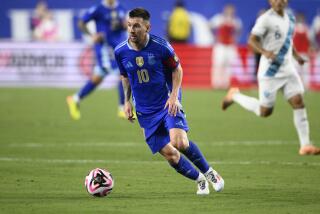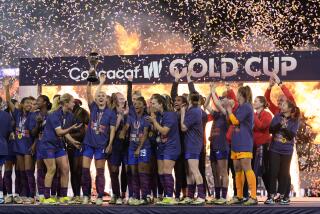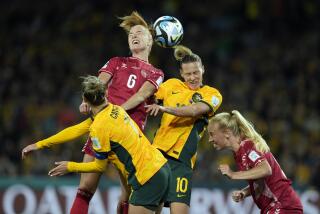Somebody Has to Go
- Share via
HAMBURG, Germany — Somewhere among the four World Cup quarterfinal matches, a great moment surely awaits.
But it is the Argentina-Germany quarterfinal clash in Berlin today that has everyone talking.
Either the host nation will be knocked out, which would put a sizable damper on things, or the tournament will lose not only one of its most attractive teams but also the possibility of an unprecedented Argentina-Brazil final.
“It’s unfortunate that this matchup comes now,” Germany assistant coach Joachim Loew said. “If you beat Argentina, you’ve eliminated a very high-quality team from the tournament. They have great technical skill, they combine well, they are experienced, they play good transition, and they have the deepest bench.”
Not that Germany has not been a pleasant surprise. The players have heeded Coach Juergen Klinsmann’s call for “fast, aggressive, attacking” soccer and have scored 10 goals, seven of them by strikers Lukas Podolski and Miroslav Klose.
Argentina, with Hernan Crespo and Javier Saviola as the spearheads, also has 10 goals, but it has so many attacking players that just how Germany will contain all of them is much in doubt.
Still, German confidence is high.
“Argentina are a strong team and were one of the favorites to win the World Cup before it started, but they have had the misfortune of coming up against us,” Klose said this week. “If we put Argentina under pressure for 90 minutes, they will make mistakes.”
The game could come down to just how well German midfielder Torsten Frings contains Argentine playmaker Juan Roman Riquelme.
“I don’t know exactly how we’ll play, but I can’t imagine I’ll be chasing Riquelme for 90 minutes,” Frings said. “We can’t make the mistake of pinning everything on Riquelme. They have a very good all-round team, and we have to share the defensive work between all of us.”
Argentina Coach Jose Pekerman, whose team played two 2-2 ties with Germany in friendly matches last year, has stayed out of the tactical debate.
“Germany have done very good things in the Klinsmann period,” he said, and it plays “an attacking style that is producing great matches for them. The truth will be revealed on the pitch.”
The Italy-Ukraine game is the nightcap today. And if Italy loses in its quarterfinal match here, don’t look for the coach they call “the Silver Fox” to stick around afterward.
Almost two months ago, Marcello Lippi, 58, told his fishing pals in his hometown of Viareggio on the Tuscany coast to expect him back and to have his boat ready. “If it goes badly, I’ll come during the night, and we’ll go out into the middle of the sea.”
That’s one way to avoid the angry clamor from media and fans that can be expected to engulf the losing coaches.
Lippi’s opponent today, Ukraine Coach Oleg Blokhin, does not have a seaside apartment with a view of the Mediterranean, let alone a boat. What he does have is a belief that Italy is there for the taking, especially because its central defender, Alessandro Nesta, is out because of an injury.
“We are not afraid of Italy,” Blokhin said. “Italy are under more pressure because they are the favorites in our game and we have already achieved what we wanted. We have already made history.”
Italy is unbeaten in 22 games, and with Ukraine missing injured striker Andriy Voronin, Lippi is unlikely to be making a quick escape in search of that fishing boat.
Saturday’s two quarterfinals are equally intriguing affairs.
The first puts Portugal Coach Luiz Felipe Scolari’s 11-game unbeaten run in the World Cup on the line and also pits him against England, which this year tried unsuccessfully to sign him as coach to replace lame duck Sven-Goran Eriksson.
The English, who have somehow bumbled through to the quarterfinals despite showing nothing to indicate they can win their first World Cup in four decades, have had two bad experiences with Scolari-coached teams.
It was Scolari, then coaching Brazil, who knocked England out in the quarterfinals of the 2002 World Cup, and it was Scolari’s Portugal that ended England hopes in the quarterfinals of Euro ’04.
Scolari has dismissed that as statistical trivia. “Just because I have beaten Eriksson once or twice does not mean I am better,” Scolari said. “Both teams have good capabilities, both teams respect each other.”
The Portuguese lost two players to red cards in their second-round victory over the Netherlands: playmaker Deco and defensive midfielder Costinha. Luis Figo probably will take over the playmaking role, with Simao Sabrosa moving into Figo’s spot on the left and Armando Petit replacing Costinha.
Portugal defender Nuno Valente said the fact that England has been bland does not mean it has been bad. “Their football is not always beautiful,” he said, “but it is effective.”
“Their strengths are in crossing, free kicks and corners. We have to try to prevent these from happening. We must pay attention to this.”
Eriksson, meanwhile, has shrugged off the criticism that has come his team’s way. “I don’t care about that,” he said. “You like to play good football, but the most important thing is to win or you are on the plane home.”
The last of the quarterfinals, between Brazil and France in Frankfurt, is a rematch of the 1998 final, which France won, 3-0. Brazil Coach Carlos Alberto Parreira has said that even though Saturday night’s match will feature many of the same players, the 1998 game will have no bearing on this game.
“There’s no atmosphere of revenge,” he said. “We’re not thinking about that.”
Like England, France has struggled through the tournament, but had its breakthrough match when defeating Spain, 3-1, in the second round. “Deep inside, that team had something that was asking to come out,” France Coach Raymond Domenech said. “Brazil will be the favorites, but they have been for 40 years. You will have 11 players on each side wanting to write history. My wish is to see a match that people will still talk about in 10 years’ time, a great moment of football.”






